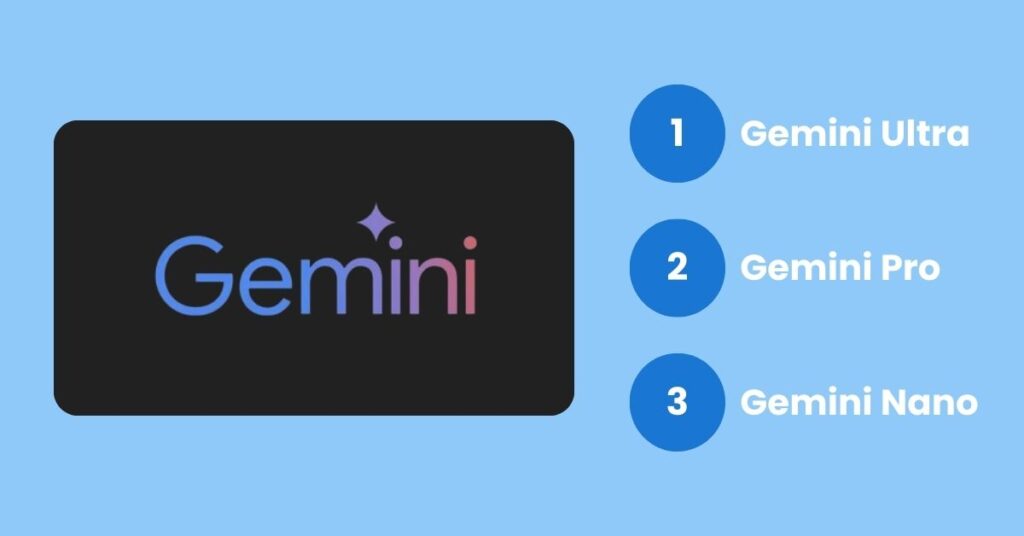Artificial Intelligence (AI) is constantly evolving, pushing the boundaries of what’s possible. With each new advancement, businesses and agencies scramble to understand its potential impact and how to leverage it for success. Google’s new Gemini AI model has notably stirred the tech community, heralding substantial advancements in AI capabilities and generating excitement and caution.
Google Gemini vs. BARD
BARD is now called Gemini. In essence, Gemini enhances BARD’s AI with better performance, functionality, and wider access, benefiting businesses and individuals.
While the core technology remains similar, here are some key improvements introduced with the Gemini rebranding:
Performance
- Enhanced factual language understanding: Gemini outperforms BARD in the LAMBDA benchmark with a better performance in tasks like answering complex questions and summarizing information.
- Multimodal capabilities: Gemini goes beyond text, interpreting images, audio, and videos – a capability not present in BARD.
- A wider range of model sizes: Gemini comes in three versions (Ultra, Pro, and Nano) to suit various needs and computational resources, unlike BARD’s single configuration.
Focus and target audience
- Enterprise focus: Gemini is designed for enterprises, optimizing for content creation, translation, and data analysis with specific features and pricing.
- More general audience: BARD targeted a broader audience and was suitable for personal and creative writing tasks.
Accessibility and pricing
- Paid subscriptions with limited free access: Gemini Pro’s full capabilities require a subscription, which may limit access for smaller businesses, a restriction similar to BARD.
- Freemium model with paid Pro version: While some speculate that a freemium model for Gemini might be introduced in the future, it wasn’t the case with BARD.
Unveiling the powerhouse
Launched in February 2024, Gemini is Google’s most advanced AI model yet, leveraging the latest deep learning innovations for superior performance across various tasks, including:
- Text-to-text generation: Gemini can craft compelling and informative content, from emails and articles to marketing copy and scripts.
- Translation: Gemini provides nuanced, context-aware translations beyond direct word-for-word conversion, maintaining the original’s meaning and tone.
- Creative content creation: Gemini excels in crafting diverse creative content, including poetry, code, music, and marketing materials.
- Question answering: For information or insights, turn to Gemini. It processes complex questions for precise, informative answers.
Google’s Gemini lineup: A multimodal powerhouse for diverse needs
Google’s Gemini AI comes in three distinct versions, each designed for specific needs:

- Gemini Ultra: The heavyweight champion, easily tackling complex tasks like advanced marketing campaigns or detailed document translations.
- Gemini Pro: The “lite” version, balancing power with efficiency for everyday tasks. It efficiently drafts emails, summarizes documents, and creates content quickly, acting as a versatile AI assistant.
- Gemini Nano: A compact AI that integrates smoothly with mobile devices, enabling quick queries, on-the-move translations, and creative writing with just a tap.
All versions of Gemini are “natively multimodal,” seamlessly interpreting words, images, audio, videos, and even code, offering a broad understanding beyond text alone.
This unlocks new possibilities like analyzing complex medical data and creating video scripts from audio.
A game-changer for businesses and agencies
Gemini transforms business and agency operations by streamlining workflows with AI tools for drafting emails, personalizing campaigns, and responding to customer inquiries with human-like accuracy. It offers:
- Enhanced productivity: Gemini’s Google Workspace features, like ‘Help me write,’ can automate tasks, saving employees time for strategic work.
- Improved customer experience: Personalizing offerings, crafting targeted content, and responding to real-time inquiries – all enabled by Gemini’s ability to understand individual preferences.
- Innovation and differentiation: Leverage Gemini to develop innovative products, design data-driven strategies, and enhance customer service.
The numbers tell the story
The impact of Gemini isn’t just theoretical. Early adoption is gaining momentum.
- Over one million users are already leveraging Gemini-powered features in Google Workspace.
- Hundreds of thousands of developers and businesses are building applications with Gemini models.
Challenges and considerations
While the potential is undeniable, challenges remain.
- Ethical concerns: As with any powerful AI, responsible development and deployment are crucial to address potential biases and unintended consequences.
- Integration and expertise: Businesses must invest in expertise and infrastructure for seamless Gemini integration and to fully leverage its advantages.
The need for a strategic approach
For businesses and agencies considering Gemini, a thoughtful approach is crucial. Here’s how to move forward strategically:
- Identify specific needs and goals: Don’t get swept away by the hype. Understand your specific challenges and how Gemini can address them.
- Start small and experiment: Begin with pilot projects or trials to assess Gemini’s impact within your organization and identify areas for further integration.
- Build expertise and infrastructure: Invest in training and resources to ensure seamless integration and maximize the value you get from Gemini.
- Prioritize responsible AI: Stay informed about ethical considerations and implement responsible AI practices within your organization.
Google Gemini vs. ChatGPT: Choosing the right AI partner
Choosing between Gemini and ChatGPT, both powerful tools, requires understanding their distinct capabilities to meet your needs.
Focus and design
- Gemini: Geared towards enterprise needs, excelling in creating informative content, nuanced translations, and solving complex queries.
- ChatGPT: Designed for conversational interactions, ideal for chatbots, personalized dialogues, and creative outputs like poems and scripts.
Performance and benchmarks
- Gemini: Achieved a score of 91.3 on the LAMBDA benchmark, surpassing ChatGPT and suggesting stronger factual language understanding. (Source: TechCrunch)
- ChatGPT: Excels in engaging and creative texts but might not match Gemini’s accuracy for certain facts.
Accessibility and pricing
- Gemini: Paid subscriptions with limited free access, potentially restricting smaller businesses.
- ChatGPT: Freemium model with paid Pro version, offering wider accessibility but potentially limited functionality in the free tier.
Additional considerations
- Integration and expertise: Both require investment in expertise and infrastructure for seamless integration.
- Ethical concerns: Both companies have initiatives for responsible AI development, but staying informed about their specific approaches is crucial.
The better choice hinges on your specific needs and goals. Assess your requirements and use each model’s advantages to harness AI in your business fully.
The future with Gemini
Google’s Gemini leads a new ear in AI, promising to revolutionize business and customer experiences. Businesses can achieve unprecedented productivity, innovation, and satisfaction by strategically using Gemini, setting the stage for a future driven by smart, transformative AI.
BirdAI: Unlocking the power of customer insights
AI is transforming how businesses understand and interact with customers. BirdAI, our own AI solution, leads the charge, unlocking insights from online reviews and feedback. We are committed to staying ahead of the curve, constantly innovating to give businesses deeper customer intelligence.
With BirdAI, you can gain a competitive edge, build stronger relationships, and achieve sustainable business growth. Watch a quick demo of the Birdeye platform to know more.

Originally published









